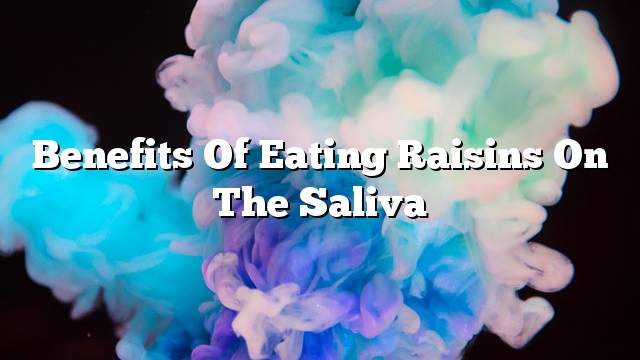Raisins
Raisins are dried grapes, and scientific studies in recent years have been interested in the benefits of healthy raisins. It contains various compounds such as phenol and phenolic acids, which can be attributed to many of the health benefits associated with it. The drying of grapes to produce raisins is a loss in some of these However, the intake of fresh grapes or raisins in the same amount results in the same level of substances resulting from the representation of phenol acids in the urine, indicating that the red The phenolic acid in raisins is available to the body more than it is in grapes.
Food content in raisins
The intake of fresh grapes, raisins and grape juice is associated with higher nutritional value of the diet. It was found that the diet of people who eat grapes is higher in their content of fruit, less saturated fat and added sugar, in addition to increasing the proportion of vitamin A, vitamin C, calcium and potassium.
Nutritional composition of raisins
One cup of raisins weighs 145 g and contains, on average, the following nutrients:
- Water: 15 g.
- Calories: 435 calories.
- Protein: 5 g.
- Total fat: 1 g.
- Carbohydrates: 115 g.
- Food fiber: 5.8 g.
- Calcium: 71 mg.
- Iron: 3 mg.
- Potassium: 1089 mg.
- Sodium: 17 mg.
- Vitamin A: 12 IU.
- Thiamine: 0.23 mg.
- Repovlavin: 0.13 mg.
- Niacin: 1.2 mg.
- Vitamin C: 5 mg.
The most important benefits of raisins
There are many health benefits of raisins, including:
- To reduce the risk of tooth decay, contrary to what can be imagined about this sticky sweet food sticky teeth, scientists found that the phytochemicals found in raisins able to fight bacteria that cause tooth decay, and some gum disease, where it found five substances to help fight decay (Oleanolic acid), which in this study can slow down or stop the growth of two types of bacteria in the mouth, namely (Strpetococuus mutans) that cause tooth decay, and (Porphyromonas gingivalis) that cause gum disease, and found that this phytochemical Prevents adhesion of bacteria Causing decay surfaces, which may play a role in preventing it from attaching to the teeth and the formation Altsusat.
- Help control blood sugar.
- A study found that eating raisins three times a day reduces blood pressure in a simple way. A study also found that eating dried grapes with full fibrillation lowered blood pressure. Another study found that eating grape juice lowered blood pressure. Other this effect of grape juice.
- Reduce the risk of cardiovascular disease, as it reduces the level of LDL (LDL) and oxidation, and its impact on blood sugar control and lowering blood pressure have a role in reducing the risk of cardiovascular disease, and in one study found that eating a cup of Raisins daily with regular exercise reduces hunger and reduces the level of bad cholesterol. These effects are attributed to the content of raisins of dietary fiber and polyphenols, where the content of one cup of raisins can reach 10 grams of dietary fiber, a For water-soluble fiber, and 850 mg of polyphenols that interfere with cholesterol uptake. Some preliminary studies also found the ability of grape juice to prevent heart disease by lowering blood cholesterol, reducing inflammation, and preventing the formation of clots.
- Contributing to the feeling of satiety and control the intake of calories, where it was found that eating raisins as a snack after school reduces the amount of total food eaten daily by children, and found that eating raisins before lunch reduces the amount of food consumed, so it is believed that raisins play a role in the fight Obesity and weight control, as it is a source of dietary fiber, and it affects the hormones of satiety in the body.
- Raisins are a source of non-heme iron.
- Grape extract can improve athletic performance.
- A study found that eating grape juice for 12 weeks improves verbal abilities in cases of poor mental abilities related to aging, while this study did not find the role of grape juice in improving memory.
- Improvement of some aspects of metabolic syndrome (a range of health problems that raise the risk of heart disease), where some preliminary studies suggest that eating whole grapes dried with 30-day milling improves blood pressure in people with metabolic syndrome.
- Raisins can improve the intake of constipation.
Adverse effects and side effects
Grape and raisins are generally safe when consumed in normal quantities and are safe in therapeutic doses. However, ingestion of grapes or dried grapes or raisins in high quantities can lead to diarrhea and may cause some possible side effects, including Intestinal disorder, dyspepsia, nausea, vomiting, coughing, dry mouth, sore throat, infection, headaches, and muscle problems. When taking grapes and raisins in therapeutic quantities, do not exceed the normal quantities found in the diet in the following cases:
- Pregnancy and lactation: There is insufficient information on the safety of the therapeutic quantities of grapes and raisins during pregnancy, so should not exceed the usual intake in these cases.
- Bleeding Disorders: Eating grapes can slow blood clotting.
- Surgery: As we mentioned that eating grapes in high quantities (therapeutic) delay blood clotting, and may increase the risk of bleeding during and after surgery, and therefore should stop taking the amount of treatment before the surgical appointments by at least two weeks.
- You should consult with your doctor before taking raisins in therapeutic quantities, especially in the case of taking medications, as they can interact with some types of drugs mediocre interaction.
